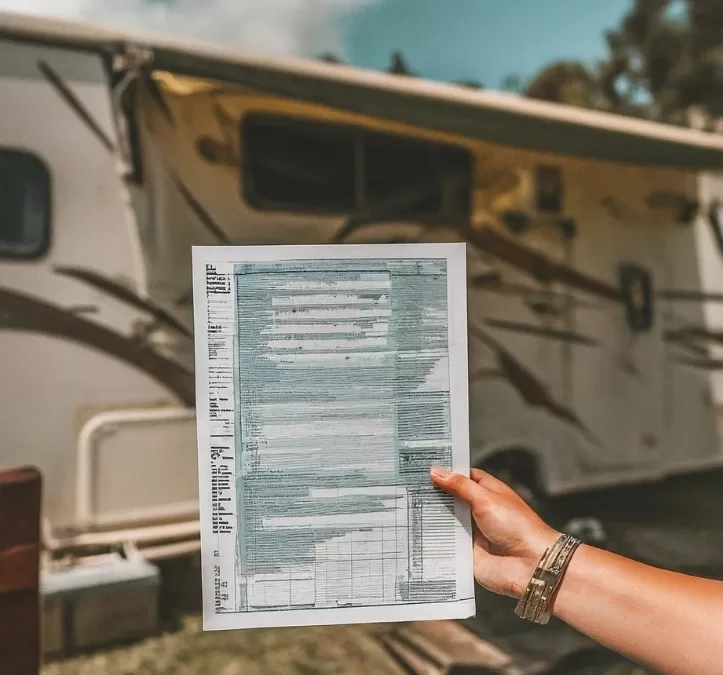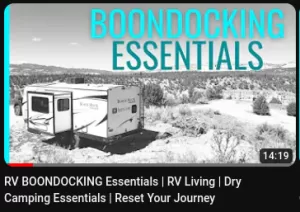Last Updated on 05/06/2024 by Glynn Willard
Can RV Owners Expense Their RV As A Tax Business Deduction?
Can I Write Off An RV As A Business Expense?
Managing taxes for a homeowner isn’t so bad.
The complications escalate when owning and running a business and a personal household.
But what if you’re a nomadic “RV dwelling” business owner?
Have we opened a can of worms?
Perhaps, but that doesn’t mean it’s impossible.
My wife and I built a successful business over twenty years before selling it and hitting the road in a travel trailer.
Because of my insatiable appetite for information, I learned how to keep the books and file business and personal taxes.
As time went on, the complications grew, so I recruited a CPA to check my work.
It was a wise move!
I want to bring you the most up-to-date and accurate information, so this article is a joint effort between myself and a CPA who specializes in digital creators living the RV life.
Her name is Penny Rose, CPA and she’s the founder of Fi Fo Fum Services.
How can she help you?
Read on to learn more about navigating the complications of business income and filing taxes as an RV nomad.

What Type Of Tax Advisor Should Full-Time RVers Hire?
Nomadic business owners have a unique situation requiring a tax expert familiar with their situation.
Yes, you can go it alone, digest the endless IRS publications, and take the risk of filing on your own.
But honestly, the investment in a tax professional will not only pay for itself and offer peace of mind, but it will also free up time to generate more revenue.
That’s a no-brainer if you ask me!
When shopping for a CPA, they must understand:
- Whether you’re a full-time or part-time RVer.
- The type of business you run (digital, real estate [rental income], or a stationary business).
- Your business entity (LLC, C-Corp, S-Corp, Partnership, or a schedule C filer).
- You’re RV lifestyle.
- Local taxes and tax laws in your domicile state.
- Sales tax collection state-by-state for service, digital, or product income.
- If you’re a remote worker, the implications of living in your mobile office.
- Personal property taxes if you’re from a state that incorporates this painful tax.
Additionally, if you’re running multiple large businesses from the road, you would be wise to incorporate a tax attorney on your team.
Understanding Some Basic Tax Terms

Skim this section and refer to it if you question any of the terms throughout this article.
Penny defines the following terms as:
- Tax home: “One major factor in determining deductibility of travel expenses is the IRS concept of your “tax home.”
If you are a full-time RVer, your tax home is your RV. When you travel, you are not away from home.
Not being away from home means few deductions.”
“If you are a part-time RVer and have a home in addition to your RV, your tax home is not your RV.
IRS considers it to be a take-it-with-you business lodging facility.
When you travel, you are away from home. Being away from home means more deductions.” - Ordinary and necessary expenses: “An ordinary business expense is common among similar businesses.
A necessary business expense is one that is helpful and appropriate for similar businesses.” - IRS definition of a business day: “Generally, IRS expects you to work Monday through Friday for over half of the day.”
“IRS does not expect you to travel on your business trip over the weekend.”
There’s an endless list of terms within the tax code for one to learn, but the above will cover terms mentioned in this article.
How Can I Use My RV For Business Purposes?
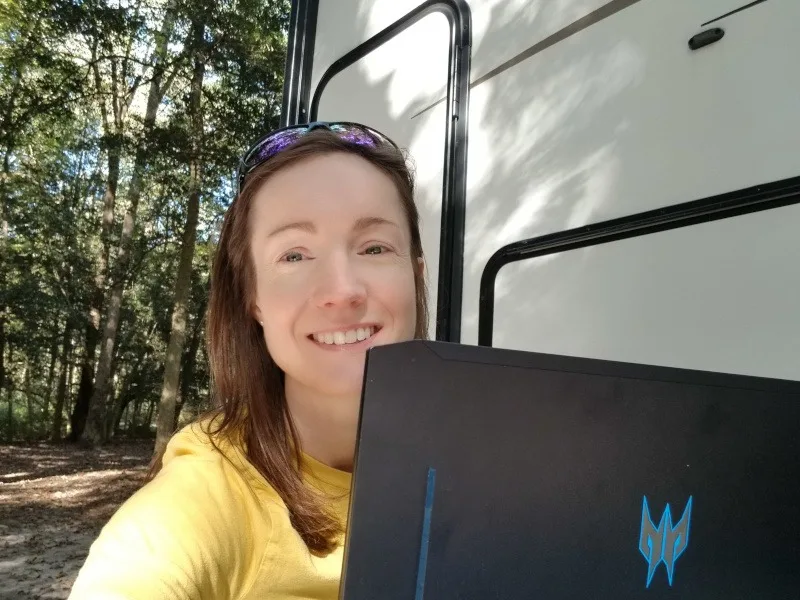
It goes without saying that an entrepreneurial digital nomad is using their RV for both business and personal reasons.
And let me begin by stating that any allowable expenses must be business-related expenses.
“When you travel with your RV, your direct route expenses for meals, and other costs of sustaining life on the road are ordinary and necessary deductible business expenses.”
What is meant by this statement?
First, from a global perspective, you have three very important considerations concerning your RV’s deductible expenses.
- Milage: It’s crucial that you track personal and business mileage weekly, monthly, and for the tax year.
Selecting an arbitrary number at the end of the year is not advisable. Keep detailed records of these numbers for your accountant. - Lodging: In addition to a mileage log, keeping a “night-sleep log” is important for IRS compliance.
- Meals: Meals are deductible if and only if you have worked over half the day during a business week.
If your family travels for you and they join you for a meal during your “work day,” their meals are not deductible.
Again, detailed records of your business-related meals and life-sustaining expenses are important for tax purposes.
Penny states that “keeping business use for both mileage and lodging over 50% is recommended.”
It’s also stated (and this is very important) that “As a part-time RVer, the cost of staying in an RV park is also an ordinary and necessary deductible expense, while full-time RVers are not able to deduct the cost of staying in an RV park.”
Read that again!
What If I Also Use My Recreational Vehicle For Personal Use?
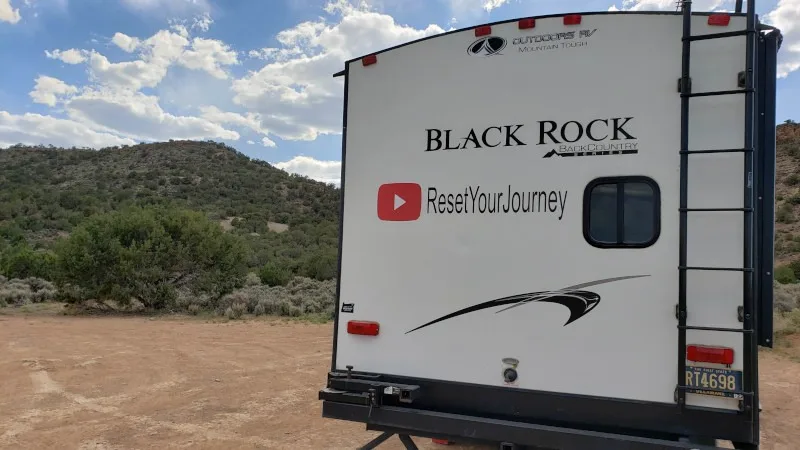
Any business usage ends the moment you deviate from the business use of your RV.
If you recall from earlier, full-time RVers cannot claim a business travel expense unless it’s by a different means of travel.
But if you’re part-time, any travel directly related to your business, including campground fees is a deductible expense.
For example, if you’re part-time and traveling to a specific location for business, but then deviate for a day to take a personal trip, the deviation is not a deductible expense.
One can see how important detailed records are.
And not just for the Internal Revenue Service, but for your own memory when compiling your records.
What RV Tax Deductions Or Tax Benefits Exist For RV Owners?
Penny’s specific quote for RV tax benefits is, “If you buy an RV for your business, you might be able to deduct depreciation on your business taxes.
However, there are some things to think about first.
The IRS sometimes sees RVs as fancy and expensive, especially when it comes to things like lodging and meals.”
If you find yourself in this situation and within question, your accountant must justify your case by showing that you followed previous court rulings.
Otherwise, RV-specific write-offs are scarce.
What If I Use My RV As A Primary Residence?
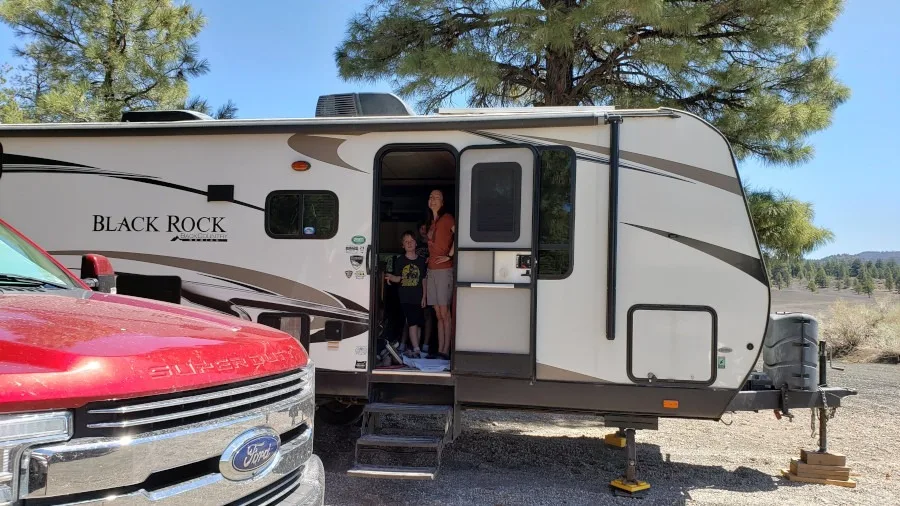
I stated earlier that there are fewer tax advantages for RV owners who travel full-time.
That doesn’t mean you can’t deduct all business-related expenses that you would normally deduct when stationary.
This is much easier if your business has a separate EIN and your business/personal accounts are separate.
What If I Use My RV As A Second Home?
Again, as stated earlier by Penny, “One major factor in determining deductibility of travel expenses is the IRS concept of your “tax home.”
If you are a full-time RVer, your tax home is your RV. When you travel, you are not away from home.
Not being away from home means few deductions.”
So if your RV is your secondary home, you have more tax advantages than a full-time RVer.
Is My RV Loan A Business Deduction?

Penny states that you’re limited to two ways to deduct interest from an RV loan.
- This method requires you to list the interest on your tax return as a deduction for a second home
“However, this usually only works in the first year if you borrow between $495,000 and $750,000.
For most people, this won’t be a practical option because the standard deduction for married couples is already quite high at $29,200 in 2024.” - This method requires you to treat the RV loan as a business expense.
But this requires the loan to be made specifically to the business under its EIN.
“The IRS doesn’t allow personal interest to be deducted. Also, the main reason for buying the RV must be for business, not personal use.”
It will be crucial to track business and personal use expenses under this scenario in case you’re flagged.
Penny offered this example:
“One person, Dellwood Jackson, successfully argued that his RV was a business expense.
He showed that he used the RV for work-related purposes and made money from it.
The tax court agreed that as long as you can show a clear business purpose, you may be able to deduct RV expenses from your taxes.”
Not Sure What You Need For Your RV?
What Are RV Tax Deductions For A Nomadic Sole Proprietor?
Like the other situations, this is first based on whether you’re full-time or part-time.
Also, if your family travels with you, the records become even more crucial.
It would be easy for the IRS to “raise an eyebrow” at questionable expenses as a sole proprietor.
There’s less of a flag if the business has its own tax ID.
Aside from that, direct business expenses that you would incur as a stationary proprietor are deductible as usual.
Be Aware Of A Tax Write-Off Red Flag

Penny offers up the following tips to avoid red flags:
- “Some things to watch out for are using special depreciation allowances like Section 179, renting out your RV, and using it for entertainment.
Section 179 can be tricky for RVs because it’s mainly for transportation, not lodging.It’s better to use MACRS depreciation for RVs.”
- “Renting your RV for extra money can affect your business expenses. Tax rules treat renting an RV like renting a home.”
- “Using your RV for entertainment isn’t a deductible business expense either.
Tax law doesn’t allow deductions for entertainment facilities like an RV used for fun, even if it’s only on occasion.”
Wrapping Up RV Tax Write-Offs

To sum up Penny’s great input for this article, she states, “Maximizing tax deductions as an RV-traveling small business owner requires strategic planning, meticulous record keeping, and adherence to IRS guidelines.”
I couldn’t agree more!
This article scratches the surface since we did not discuss home office space or potential depreciation deductions.
Of course, we have to include the obligatory disclaimer.
Your situation is unique to you, so the examples given may or may not apply to you.
This is one more good reason to “arm yourself” with a qualified tax professional such as Penny Rose, CPA!
Bottom line, use caution and it’s more than a good idea to hire a qualified tax specialist when including your RV into your “write-off” game plan.
You can connect with Penny via the following links:
- Fe Fi Fo Fum Services
- Penny’s Instagram
- Penny’s LinkedIn
Do manage your taxes on the road or hire a professional?
Meet the author.
We appreciate any help in bringing you great content. Donate or buy us a coffee on our Ko-Fi site. Or subscribe to our YouTube Channel.
Thank you so much for being here!


